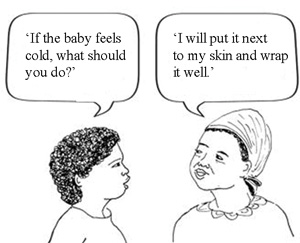Counselling mothers during the postnatal period
To standardise the counselling of mothers during home visits for PNC, you should use the counselling cards. When counselling mothers, it is always important to use the following skills:
- Ask and listen: Find out what the mother is already doing for her child and herself by asking thoughtful questions and listening carefully to her answers. Then you will know what she is doing well, and what practices need to be changed.
- Praise: Praise the mother for something helpful she has done. It is likely that she is doing something helpful for herself and the newborn; for example, she may be eating a good diet, breastfeeding the baby exclusively, and keeping herself and her baby clean. Be sure that the praise is genuine, and only praise actions that are indeed good for her health and that of her baby.
- Advise: Limit your advice to what is relevant to the mother at this particular time. Too much advice, or advice given at the wrong time, can be overwhelming and the mother may ignore it. Use language that the mother will understand. If possible, use pictures, screening cards, or real objects to help explain clearly what you want her to do, know or understand.

Check carefully that the mother has understood your health messages.
- Check understanding: When you explain something to the mother, ask questions to find out what she understands and what needs further explanation. Avoid asking leading questions (that is, questions which suggest the right answer to her even if she does not understand); also avoid questions that can be answered with a simple yes or no, because they do not help you to check exactly what the mother has understood.
The critical maternal health issues that you should address during counselling in postnatal home visits are shown in below
Health issues to counsel the mother on
- Identification of general danger signs
- Emotional support
- Support for maternal nutrition
- Establishing optimum breastfeeding
- Hygiene and infection prevention
- Support for family planning
- Special care for HIV-infected mothers
- Early care seeking for the mother and the newborn baby if problems arise
- Routine care of a normal baby.
You are on your second visit to a mother of a newborn baby delivered at home. She tells you the baby is crying a lot, that she has had little sleep, and is feeling sore and very run down. What do you do?
Show answer
Obviously you need to find out more. Is the mother finding it difficult to feed the baby – might she have mastitis? Have mother or baby got an underlying infection, e.g. problems with the umbilical cord stump in the baby, or a perineum wound infection in the mother? Is she getting the extra nutrition she needs, and are her family and community supportive? If your initial questioning (and examination if necessary) satisfies you that there is nothing seriously wrong, then you can advise her accordingly. If you think there may be something more serious, you should consider referral.
Last modified: Friday, 23 May 2014, 10:39 AM